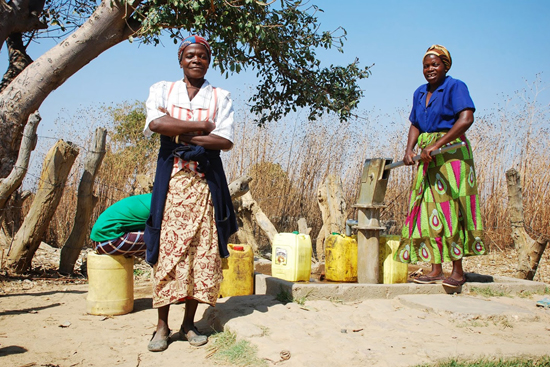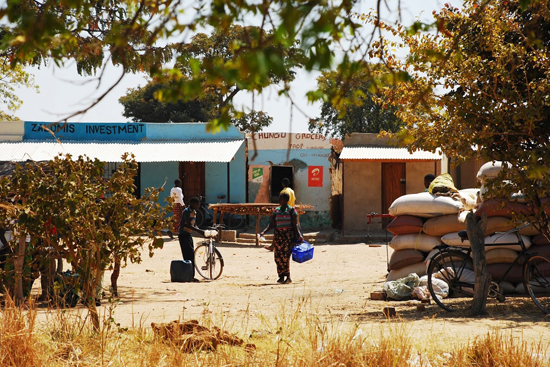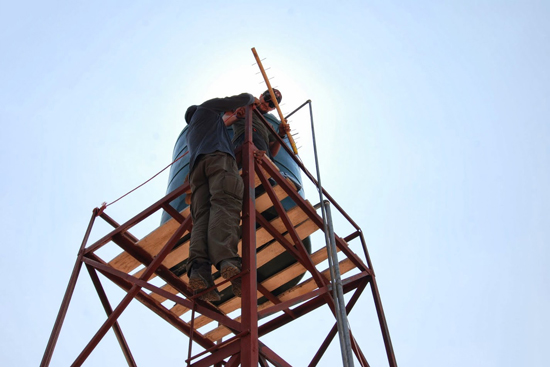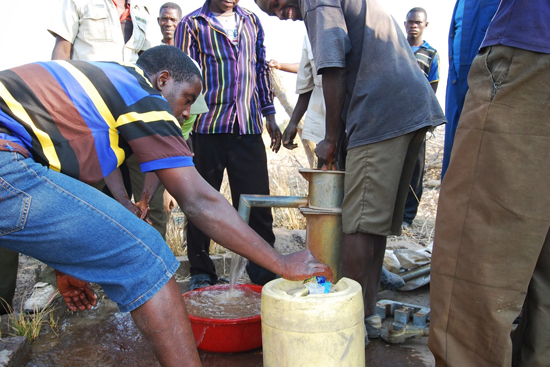In Zambia, Text Messages Save Lives
BU’s EWB chapter brings clean water, internet to rural village

Identifying water quality as a significant issue in the Zambian village of Naluja, the EWB-BU chapter designed a slow sand filtration system that gave individual families access to clean water. Photos courtesy of Nathanael Lee
Two College of Engineering students from the BU’s student chapter of Engineers Without Borders traveled last summer to Zambia in partnership with BU’s Center for Global Health & Development to work on several projects designed to improve the lives of rural residents. This is an account of their trip.
When we first stepped off the plane last August in Zambia’s capital, Lusaka, we were greeted by the ubiquitous dust of the country’s dry season. We drove past fires on the side of the road, whose smoke mixed with the dust and followed us throughout our trip: from the bustling city, south to Livingstone, and out to our destination, the rural village of Naluja.
Two members of the BU student chapter of Engineers Without Borders (EWB-BU), founded six years ago, Nathanael Lee (ENG’15) and Dan Sade (ENG’14), traveled to Zambia in a partnership with BU’s Center for Global Health & Development (CGHD). We were joined by our mentors, Mohammed Jafri and Hunter Chaconas of the Boston chapter of the national organization of Engineers Without Borders, which focuses on global outreach.
As members of EWB-BU, we want to use engineering solutions to improve the quality of life of people in developing communities, the mission of the national EWB. Our chapter is currently concentrating solely on our partners in Zambia.
Our two and a half weeks in the landlocked central African country took us through many different cities and towns. In Lusaka, we saw people living as they do in cities elsewhere: driving cars, using smartphones, and wearing designer clothing. Smaller towns like Choma or Kalomo revealed a slower side of Zambian life, one strongly tied to the country’s agrarian roots.

Naluja is a village of about 11,000 people, located in a region of climatic extremes. Each season brings a different threat, and the health and safety of Nalujans are never guaranteed. In the dry season, perhaps the most forgiving time of the year, wells go dry, livestock die of thirst, and people struggle to sell their crops on the national market. In the hot season that follows, temperatures exceed 100 degrees. While the wet season brings much-needed water and rain, it also brings malaria-carrying mosquitoes. Life in Naluja is a combination of tradition and modernity. Despite its isolation, residents text friends and family on cell phones whose ring tones may be the latest Kanye West song.
This past summer’s visit was intended to advance projects begun by an EWB-BU team that visited Naluja in August 2012. That team, comprising Lee, Jafri, Grace Wang (ENG’14), and Declan Bowman (ENG’15), gathered valuable information about health care, electricity and water usage, and infrastructure. A baseline community health assessment was also conducted. Team members then considered four options for bolstering the text messaging system: a parabolic dish reflector, an active booster, a cantenna (a homemade waveguide directional antenna), and a Yagi antenna. Throughout the following academic year, the entire EWB team at BU dedicated a large part of their efforts to identifying the best solution, and settled on the Yagi antenna, a robust device that can be made relatively easily from low-cost materials available in Zambia.
The 2012 team also identified water quality as a significant issue. The BU chapter designed a slow sand filtration system that gave individual families access to clean water.

This year we wanted to use the research our group did throughout the year and implement the Yagi design, while presenting the idea of water filters to the Zambian community. Because the projects required diverse engineering skills, our team comprised one student in mechanical engineering (Sade) and one in biomedical engineering (Lee). Jafri is an electrical engineer and Chaconas a civil engineer.
No matter how thorough our research and prototyping efforts were in Boston, it was hard to anticipate the situations we would face in the harsh Zambian environment. In the case of the Yagi, we decided that the optimal mounting site would be on top of the village’s water tower. After several days and many attempts to align the antenna, the moment of truth arrived. Nate pulled out his phone to check if we had a signal: two bars. Yes! We were thrilled that our project was successful, and we were happy to hear that some of the villagers planned to copy the design in their own homes, projects that were already under way before we left.
This school year, we expect to further refine our antenna to make it more functional and robust, and we are pleased that the Zambia Center for Applied Health Research and Development, a CGHD partner, is interested in expanding our Yagi antenna to other rural clinics.
Our assessment of the water filter was also encouraging. The original aim was to test the viability of the design, which was widely used in the United States until the 1980s. Once local villagers saw the ease and simplicity of our design, they quickly adopted it and made modifications. In the eight days we were in the area, we saw them scale it up from a simple 5-gallon bucket to a 55-gallon barrel that could filter water for multiple households. With the current setup, testing kits for water quality will be sent monthly to our local NGO in the area, allowing us to closely monitor how well the prototypes made by the locals perform. In keeping with Engineers Without Borders USA regulations, the locals have agreed not to use the water unless it has been tested and cleared. We are looking forward to next year’s project implementation on a much larger scale, and to looking into a water storage system that can help alleviate the village’s water needs during the dry season.

When we asked the Nalujans what projects they would like us to take on next, a dam was high on the list. The villagers had built two dams for watering their cattle, and one had fallen into disrepair, largely because of a design flaw. We know they are capable of building one, but they need a better design, something that none of us was equipped then to help them with. We will, however, use our resources at BU this year to see what solutions we might be able to implement.
The village elders and the head nurse of Naluja also asked us to help them turn an SUV into an ambulance to transport the sick and injured to a hospital two hours away. We hope to do that next year, if and when sufficient funds can be raised to buy a vehicle.
Having completed two successful student-organized trips to our partner community in Zambia, EWB-BU is anxious to grow our membership and raise money. We have an ambitious goal of raising $50,000 this year to fund our projects and ensure we can fulfill our commitment to our Naluja partners. We have a long road ahead, but we know that our hard work and passion are being translated to a better quality of life for people around the world. As engineering students, we can think of no better way to apply our skills.
Anyone who would like to make a donation to Engineers Without Borders at Boston University can do so here.
Learn more about the BU chapter of Engineers Without Borders here or follow the group on Facebook and Twitter.
Nathanael Lee can be reached at natelee@bu.edu, Daniel Sade at dsade@bu.edu, Alan Pacheco at pachecoa@bu.edu, and Teresa Fulcher at tfulcher@bu.edu.
Comments & Discussion
Boston University moderates comments to facilitate an informed, substantive, civil conversation. Abusive, profane, self-promotional, misleading, incoherent or off-topic comments will be rejected. Moderators are staffed during regular business hours (EST) and can only accept comments written in English. Statistics or facts must include a citation or a link to the citation.